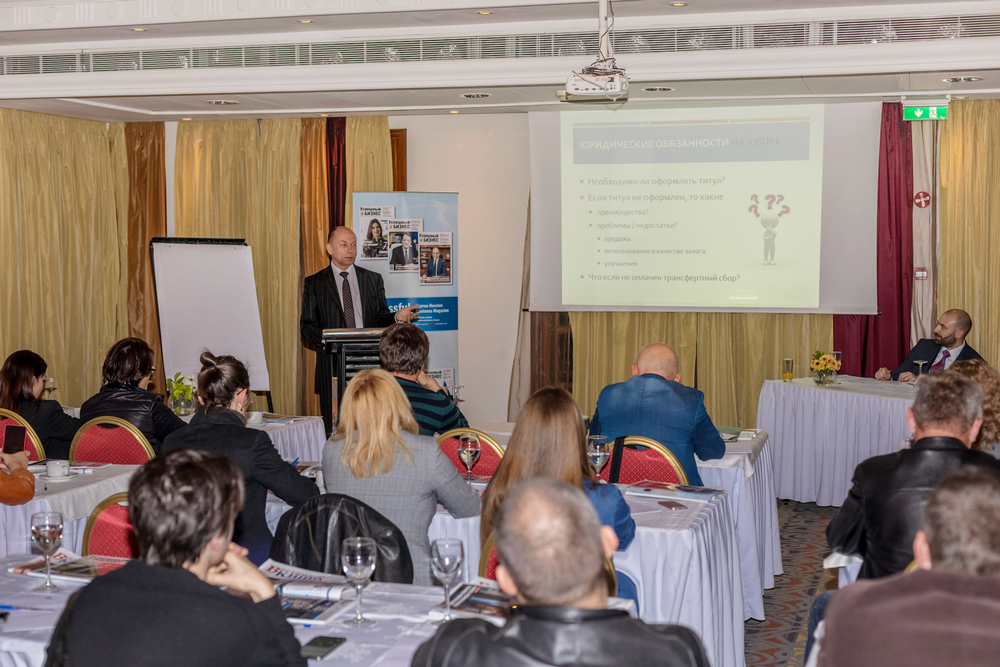Десятки тысяч объектов недвижимости на Кипре не имеют титулов на право владения ими. И часто повинны в такой ситуации именно покупатели. Что же плохого в том, что нет титула?
С одной стороны, люди спокойно живут в этих домах и квартирах. С другой - вот лишь три ситуации, когда хорошо бы титул иметь.
• Получение кредита под залог недвижимости. В перечне документов банка для начала рассмотрения вопроса о выдаче кредита обязательно есть титул. Если у заявителя его нет, банкиру проще не рассматривать просьбу клиента, чем продолжать процедуру и брать на себя повышенные риски.
• Продажа объекта. Да, его можно продать и без титула. Например, просто переведя права на оформление собственности с продавца на покупателя. Однако каждый такой покупатель будет понимать, что он берёт «кота в мешке». По каким причинам не был ранее получен титул? С чем придётся столкнуться новому владельцу при желании получить этот документ? Зачем вообще брать на себя риск, если на рынке есть множество объектов с полным комплектом документов?
• Желание перестроить объект. Конечно, можно подать заявку на изменение архитектурного плана, но это надо делать после того, как комиссия проверила, что объект недвижимости соответствует первоначальному плану. А когда эта комиссия доберётся до вашего дома?
Если же титул уже на руках, то на Кипре реновацию проводят, обычно не получая разрешение на неё, хоть это и противоречит установленным регламентам. И покупателя редко смущает, что к объекту с титулом «приросло» что-то дополнительное, не указанное в архитектурном плане.
По каким же причинам может не быть титула?
• Строительная компания, продавшая вам квартиру или дом, не торопится оформлять титул. Особенно, если вы уже оплатили 100% суммы контракта.
• Объект был как-то перестроен владельцем, что нарушило первоначальный архитектурный план. Например, построена крытая веранда или навес над парковкой.
• Вы - гражданин третьей страны и не получили разрешение Совета министров на покупку недвижимости. Одной из причин этого может быть то, что вы купили объектов больше, чем имеет право оформить на себя иностранец.
Кстати, о последнем пункте. Спросите любого застройщика, агента, продавца о том, можно ли иностранцу приобрести несколько объектов. В редком случае вам скажут, что есть ограничения и посоветуют вариант решения. Потому что главная задача продавца – продать. А на самом деле законом установлен лимит: свидетельство о собственности иностранцу из «третьей страны» может быть выдано только, если он предоставит разрешение Совета министров. Но для этого он (или семейная пара) должен владеть не более чем двумя объектами (2 дома/квартиры, или 1 дом плюс 1 магазин) с соблюдением установленных лимитов. Размер участка земли, который может купить человек, не являющийся гражданином ЕС, составляет не более 4014 кв. м.
Что же делать, если хочется иметь в собственности более двух объектов? Остальные объекты можно оформить на собственную компанию и получить титулы на неё. Но надо учесть стоимость регистрации и обслуживание такой компании.
Эти и другие, не менее интересные вопросы были подняты 12 марта в ходе семинара «Недвижимость на Кипре: руководство пользователя».
Фото мероприятия: "Вестник Кипра"





Запрет на въезд в страну, отмена авиарейсов, закрытие гостиниц, кафе и мест общего пользования - как кипрский туризм переживет чрезвычайные меры по борьбе с коронавирусом?
Закрытие въезда в страну
Въезд на Кипр закрыли для всех, кроме граждан Республики Кипр, граждан Евросоюза или граждан третьих стран, которые законно проживают или работают на территории страны, являются членами дипломатического корпуса, учатся в кипрских вузах или осуществляют важные рабочие поездки. Те, кому на Кипр можно, должны иметь при себе справку об отсутствии коронавируса — без нее даже не посадят на самолет. Получить документ можно только в официальных медицинских центрах и лабораториях. Но даже выполнив все эти условия, остров увидеть получится только через 14 дней — именно столько длится карантин для всех, кто попал в страну. Это решение вступит в силу сегодня, 16 марта, с 18:00. Ограничение будет действовать 15 дней. То есть, по сути, все это время на Кипр не сможет попасть ни один турист.
Закрытие гостиниц
Работа гостиниц приостановлена до 30 апреля. Отели должны закрыться в течение шести дней — это время дается на то, чтобы дать оставшимся постояльцам время на возвращение домой.
Отмена авиарейсов
Пока о приостановке полетов заявили компании Jet2, TUI Airways, «Россия», S7 Airlines, «Победа» и «Белавиа».
Jet2 будет выполнять репатриационные рейсы из Ларнаки и Пафоса до 20 марта — всех пассажиров проинформируют об изменениях.
Авиакомпания TUI Airways перестанет летать в Пафос из четырех британских городов — Манчестера, Бирмингема, Лондона и Бристоля.
Пассажиры рейсов 14 и 15 марта смогут вернуть деньги, всем остальным предложат альтернативный отдых со скидками.
Авиакомпания «Россия» отменяет рейсы из московского аэропорта Внуково и петербургского Пулково в Ларнаку с 14 марта. Компания будет выполнять только обратные рейсы для вывоза пассажиров.
Авиакомпания S7 Airlines приостанавливает рейсы в Ларнаку с 16 марта по 31 мая. Перевозчик предлагает оформить возврат полной стоимости авиабилета, а также без штрафов обменять его на более поздние даты или другие направления.
«Победа» с 16 марта приостанавливает полеты из московского аэропорта Внуково в Ларнаку. Вывозить клиентов с Кипра в Москву будут до 26 марта.
Авиакомпания «Белавиа» приостанавливает полеты в Ларнаку до конца марта. Возврат денег можно сделать до 31 декабря 2020 года.
Как будут спасать кипрский туризм?
Государство выделит дополнительные кредиты на общую сумму 11 млн евро на период между июнем и сентябрем 2020 года. Деньги пойдут на поддержку отрасли — правительство вместе с авиакомпаниями и туроператорами готовят возможные пути выхода из кризиса. Если ситуация затянется, то первых туристов будут приглашать на Кипр лишь с октября 2020 по март 2021 года.
Власти Кипра пошли на чрезвычайные меры — приостановлена работа учебных и развлекательных учреждений, гостиниц, кафе и торговых центров.
Банки, по решению властей, могут продолжать свою деятельность, если они строго соблюдают правила гигиены, а также не создают очередей — на 8 кв.м должно быть не больше одного человека, считая персонал.
После заседания Совета министров Республики Кипр президент Никос Анастасиадис в воскресенье, 15 марта, объявил о новых мерах по сдерживанию коронавируса. Особое внимание — поддержке бизнеса: от снижения налога на добавленную стоимость до выплаты пособий разным категориям работников.
Приостановка трудовой деятельности
К компаниям, которые приостановили работу или продолжают работать с потерей оборота более, чем на 25%, будет применяться план приостановки трудовой деятельности. Сотрудники получат пособие по безработице за период простоя.
Поддержка малого бизнеса
План поддержки распространяется на компании, в которых трудятся менее пяти сотрудников. Если такая организация продолжает работу несмотря на снижение оборота более, чем на 25%, и не планирует увольнять сотрудников, то государство выплатит ей компенсацию. Ее размер — до 70% от зарплаты каждого наемного рабочего.
Выплата пособий по болезни работникам
Пособия в размере примерно 800 евро в месяц получат:
— работники, которые имеют проблемы со здоровьем и внесены в реестр, который готовит Министерство здравоохранения. Это те люди, которые не могут ходить в нынешних условиях на работу, так как должны защищать свое здоровье. В этом случае понадобится справка от личного врача;
— работники, которые отсутствовали на рабочем месте вынужденно — из-за рекомендаций или указа властей (Категория 1: «вынужденная изоляция под медицинским наблюдением (карантин)», Категория 2: «самоизоляция с консультациями по телефону»), при условии, что у них есть справка от Минздрава;
— люди в возрасте 63-65 лет, которые не получают пенсии и продолжают трудиться. Им также нужно иметь справку от Минздрава;
— больничные будут выплачиваться и самозанятым.
Перенос дополнительных обязательных выплат в ГЕСИ
Повышение выплат в ГЕСИ, которое должно было начаться с 31 марта 2020 года, отложили на два месяца. Мера коснется государства, работодателей и наемных работников. При этом график запуска второго этапа ГЕСИ не меняется. В случае если для реализации второго этапа потребуются дополнительные расходы, их возьмет на себя государство.
Пособия для родителей на карантине
Государство готово компенсировать четыре недели карантина всем родителям, которые работают в частном секторе и воспитывают детей младше 15 лет. Они смогут рассчитывать на оплачиваемый отпуск в течение четырех недель без учета праздников. В дальнейшем этот срок могут увеличить, но конкретного решения по продлению пока нет. Эти четыре недели пособия будут получать родители с зарплатой до 2 500 евро: первая тысяча евро зарплаты будет покрываться пособием в размере 60% от зарплаты, вторая тысяча – пособием в размере 40%. Для неполной семьи доля пособия увеличивается до 70% и 50% соответственно. Отпуск будет предоставляться только одному из двух родителей. Сотрудникам государственного сектора, у которых есть дети, должны найти замену.
Поддержка сотрудников, работающих на вечерних программах Минобразования
Пособие в размере полной заработной платы получат 5 000 человек, которые заняты на дневных и вечерних образовательных курсах Министерства образования, культуры, спорта и молодежи: музыкальных и спортивных школах, государственных институтах, школах полного дня, дневных и вечерних программах технических учебных заведений.
Поддержка компаний, обеспечение ликвидности и стимулирование внутреннего потребления
Обязательную выплату НДС временно приостановят на два месяца. Эта мера коснется компаний, оборот которых был не выше 1 млн евро согласно их налоговым декларациям за 2019 год, и компаний, оборот которых сократился более чем на 25%. Неуплата НДС не повлечет за собой штрафов. Будет принято распоряжение, согласно которому задолженность можно выплачивать постепенно до 11 ноября 2020 года.
Временное снижение НДС
Как только будет принято соответствующее законодательство по поддержке покупательной способности граждан и стимулированию потребления, НДС снизят с 19% до 17% на два месяца, а сниженную ставку НДС — с 9% до 7% на 3,5 месяца.
Перенос подачи налоговой декларации
Обязательную подачу налоговой декларации перенесли на два месяца. Новый срок подачи – 31 мая 2020 года.
Поддержка банковского сектора
Кипрские финансово-кредитные организации получат доступ к европейской ликвидности на благоприятных условиях. Меры, принятые Европейским центральным банком, касаются высвобождения капитальных резервов, размер которых Центробанк Кипра оценивает на уровне 1,3 млрд евро. Кроме того, Центробанк Кипра изучает дальнейшие меры локального характера, которые будут объявлены в ближайшее время.
Министр финансов Кипра Константинос Петридис заявил, что Кипр близок к завершению разработки пакета финансовых мер для стимулирования экономики в сложных условиях, вызванных вспышкой коронавируса.
Министр отметил, что это стало возможным благодаря бюджетным резервам, созданным в результате дальновидной фискальной политики.
Константинос Петридис и министр труда, социального обеспечения и социального страхования Зета Эмилианиду обсудили с представителями политических партий доработки к пакету мер в рамках усилий Правительства Кипра по стимулированию экономики.
«Нет никаких сомнений в том, что станет значительной нагрузкой на бюджет и затронет экономический рост, но я хотел бы подчеркнуть, что разумная налогово-бюджетная политика, которой мы предусмотрительно придерживались в последние годы, дает нам возможность принять необходимые меры», - заявил министр финансов Кипра.
Ни Bank of Cyprus, ни Hellenic Bank не зафиксировали значительных изменений в количестве посещений клиентов. Операции в банкоматах также остаются на обычном уровне, сообщает издание Phileleftheros.
Источники в банках считают преждевременным предположение о том, что коронавирусная инфекция повлияет на поведение клиентов и сократит число посещений кредитных учреждений.
Банковские служащие работают в обычном режиме. Исключение - нескольких человек, которые остались дома по профилактическим причинам после возвращения из поездок в страны повышенного риска согласно инструкциям Минздрава.
Банки принимают меры предосторожности для обеспечения непрерывной работы.
Турсектор Кипра ждет настоящая битва за клиентов. Такими будут последствия распространения коронавирусной инфекции, считает глава Подминистерства туризма Саввас Пердиос.
Члены парламентского комитета по вопросам торговли, обсудив проблему, пришли к выводу: первоочередная задача сегодня — обуздать неизбежные финансовые потери, которые затронут отрасль в ближайшие месяцы.
В мировом масштабе Всемирная туристская организация, которая ранее предсказывала четырехпроцентный рост мирового туризма, сейчас прогнозирует его трехпроцентное снижение по всему земному шару и 15-процентное снижение турпотоков в Средиземноморском регионе. И это — самая оптимистичная оценка.
Чтобы ограничить ущерб для сектора туризма, Минздрав Кипра даже пошел на сомнительные с точки зрения борьбы с заболеванием меры. Ведомство отменило свои рекомендации по обязательной самоизоляции для тех, кто прилетел из Великобритании и Греции, кроме трех регионов последней — Ахеи, Элиды (или Илии) и с о. Закинф. Это решение явно было направлено на то, чтобы ограничить убытки турсектора, так как из двух этих стран приезжает колоссальное количество туристов.
До конца февраля бронирования отелей были на своем привычном, высоком, уровне, но в последние две недели динамика отрицательная. Глава подминистерства Саввас Пердиос сказал, что кипрский сектор туризма в ближайшие несколько месяцев столкнется с серьезными последствиями распространения коронавируса. Он также сообщил, что некоторые рынки, на которые Кипр нацеливался в этом сезоне, в настоящее время заблокированы из-за ограничений, связанных с заболеванием. «Наши усилия в этом году будут заключаться в том, чтобы максимально ограничить ущерб, — сказал он. — Это трудное время для туризма, не только на Кипре, но и на международном уровне. Стране может потребоваться полтора года, чтобы полностью восстановиться». Подминистерство нацелено на то, чтобы поддержать гостиничный бизнес и усилить рекламу, но если гражданам некоторых стран предписывается по прибытии на остров две недели провести в карантине, они едва ли полетят за этим на Кипр.
На совещании в Министерстве финансов, которое пройдет сегодня, будет, скорее всего, принято решение о предоставлении туристической отрасли дополнительного финансирования в летние месяцы.
Эпидемия коронавируса уже затронула Кипр. Кроме того, будучи маленькой и открытой экономикой, страна находится под сильным влиянием любых внешних потрясений. Туризм, услуги, судоходство в значительной степени зависят от внешнего спроса, и замедление мировых экономических процессов неизбежно скажется на кипрской экономике.
ОЭСР 9 марта опубликовала отчет о перспективах мировой экономики, подчеркнув, что COVID-19 представляет для нее наибольший риск после финансового кризиса 2008-2009 годов.
Ситуация и перспективы принятия возможных мер будут рассмотрены 11 марта на встрече в Министерстве финансов под руководством министра Константиноса Петридиса с участием руководителей Федерации работодателей и промышленников Кипра (OEB), Торгово-промышленной палаты Кипра (CCCI), Ассоциации отельеров Кипра (PASYXE) и Объединения туристических ассоциаций Кипра (STEK). Присутствие на встрече лидеров гостиничной индустрии не случайно, ведь туризм - это сектор, который в наибольшей степени затронут происходящие события.
Авиаперевозчик Cyprus Airways уже объявил о временных изменениях в графике полетов в марте и апреле.
Продолжаем рассказ* об истории мировой банковской системы. В XVII веке итальянские жиробанки постепенно распространили свое влияние и методы работы на всю Европу.
Нидерланды. В столице Нидерландов Амстердаме – центре международной торговли XVII-XVIII веков – процесс формирования банковской сферы шел особенно интенсивно.
Денежная система Нидерландов сформировалась в условиях конкуренции института частных кассиров и городского государственного разменного банка. Для обслуживания международной торговли в Амстердаме возникли кассиры, которые должны были заменить менял. Кассиры занимались кредитованием купцов на платной основе, а также меняльным делом. Для разделения кредитных и разменных функций городскими властями в 1609 году был создан разменный банк. Он занимался разменом монет и следил за качеством денег, разделив все монеты на полноценные и порченные (стертые, меньшего веса).
Деятельность разменного банка и его конкуренция с кассирами позволили чеканить с 1681 года собственную городскую монету – гульден. Разменный банк был преобразован в депозитный и переводной банк, основной задачей которого стал отбор хороших монет. Однако и хорошие деньги не имели твердого металлического содержания, и курс их держался на авторитете банка. Так же поддерживался и курс ценных бумаг банка – квитанций (рецеписс), которые выдавались в обмен на хранившиеся в монете вклады.
Для упрочения надежности денег и ценных бумаг банк стал практиковать обеспечение ссуд благородными металлами. Также банк активно участвовал в операциях со своими квитанциями, скупая и продавая ценные бумаги в периоды скачков цен на них. Одновременно банк использовал эти бумаги в вексельном обороте, став центром вексельного обращения.
Германия. Опыт формирования банковской системы Амстердама был использован в других крупных городах Европы – например, германских Любеке и Гамбурге.
В других городах Германии прообразы банков формировались на основе филиалов итальянских торговых домов. Это были полные товарищества или товарищества на вере. Деятельность германских торговых домов была менее регламентирована, чем итальянских, и сводилась к привлечению средств со стороны феодалов, торговцев и их кредитованию.
Франция. Для организации денежного обращения и банков в некоторые германские княжества были приглашены из Франции гугеноты – профессионалы вексельного и безналичного обращения. С их помощью был создан первый ремесленный банк.
* Эта статья из архива «Успешного бизнеса» была впервые опубликована в январе 2015 г. Обращаем ваше внимание на то, что с момента написания текста могли произойти изменения, либо часть информации могла устареть.
Слово «банк» произошло от итальянского «banco», что в переводе означает стол, на котором средневековые менялы раскладывали монеты. Мы уже писали о первых деньгах и денежном обращении. Сегодня расскажем* о древних прообразах банков.
Денежную систему Древнего Рима создавали в основном выходцы из Греции. Поэтому они развивали главным образом греческую денежную систему.
В Древнем Риме аргентарии (люди, выполняющие денежные операции) создавали ассоциации, в которых предпринимательский риск распределялся между всеми участниками. Ассоциации взимали налоги, принимали вклады, участвовали в продажах товаров с публичных торгов, вели наследственные дела и выступали свидетелями при совершении брачных контрактов. Число денежных лавок строго соответствовало числу аргентариев. Остальные специалисты не имели права осуществлять кредитные операции и занимались меняльным делом.

Золотые монеты (флорины) Флоренции (1252 год).
Государство в качестве противовеса храмам активно поддерживало ассоциации, создавая с этой целью собственные денежные фонды.
Светская и духовная власти, поддержи ваемые общественным мнением, постоянно выступали против высоких процентных ставок, за их ограничение или запрет. Римский папа Лев Великий (V в.) распространил канонический запрет процентов на всех христиан. Византийский император Юстиниан (VI в. ) ограничил верхнюю границу процента: 8% – для купцов и 6% – для остальных.
Государство и церковь осуществляли комиссионно-расчетные операции по внутренним и международным платежам, торгово-комиссионные операции (купля-продажа иностранных монет и драгметаллов), выдачу поручительств, гарантий, давали консультации, осуществляли доверительные операции, включая бухгалтерское обслуживание.
С падением Римской империи повысилась роль ассоциаций городов Северной Италии. Однако на них падала тень от деятельности нелюбимых обществом ростовщиков, ставящих целью не развитие экономики (кредитование торговли, ремесел, строительства и т.д.), а простое приращение денег.
Разграничение ростовщических и кредитных сделок произошло с появлением кредитных денег (векселей) и проведением на их основе операций по учету переводных векселей. В Италии переводные векселя действовали сравнительно короткое время. В Венеции передаточная надпись на векселе была запрещена в 1593 году.
В Венеции первое товарищество закрытого типа, похожее на депозитный банк, оформилось в 1171 году на базе паевого товарищества. В дальнейшем частные товарищества создавались и функционировали в условиях конкуренции с торговыми домами.
Начиная с XIII века, деятельность товарищества (банка) жестко регламентировалась городскими властями. Оно обязано было внести залог, было ограничено в проведении операций, величине денежных сумм. Товарищество полностью находилось под надзором городских учреждений. Члены товариществ тщательно проверялись сенатом.

Золотые монеты(дукаты) Венеции(1284 год).
Подобная тесная близость к городским властям приводила к разорению многих товариществ, вынужденных финансировать дорогостоящие войны Венеции. Выжили самые сильные из них, раскинувшие свои филиалы по всей Европе.
В 1619 году общественное товарищество в Венеции получило название жиробанк (от лат. giro – «оборот»). Основными его операциями стали платежи монетой и ценными бумагами товарищества. Последнее обеспечило ограничение круга клиентов, личное присутствие клиента по приказу жиробанка, появление наличной кассы для удовлетворения требований вкладчиков.
Постепенно итальянские товарищества распространили свое влияние и методы работы на всю Европу.
Продолжение следует.
* Эта статья из архива «Успешного бизнеса» была впервые опубликована в январе 2015 г. Обращаем ваше внимание на то, что с момента написания текста могли произойти изменения, либо часть информации могла устареть.